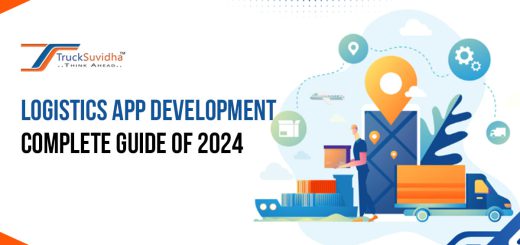Why is GST Important in the Truck Transport Business?
Travelling with bags and babble imposes some charges as you cross the boundary locations. The literal meaning is to move goods from one place to using a truck transport business. Be it an intracity, intrastate, or intracountry. The concerned authority asks for a definite tax. Sometimes, truck owners and transporters are compelled to pay more tax. Thanks to GST, it cuts the necessity to pay indirect taxes.
Explore the GST Essence in the Transport Business
GST is an all-in-one tax entity that does not require further payment of service, entry, and octroi tax. Otherwise, you bear inefficiency and compliance burdens while requesting truck transport. Regarding staying tuned with GST, the transport business streamlines, organizes uniformity, and minimizes complexities.
As per GST, transportation has a different service charge depending on its variety. The transportation GST rate varies depending on what service providers offer their customers: goods transport, passenger transport, or logistics-related services. The GST rate standardization brings deserved uniformity in state-specific truck transport.
Before reflecting on GST obligations, the different tax structures lead to delays and increased overall costs. However, the unique tax brings simplicity to all locations’ transportation businesses.
Acceptability and Exemption for GST Transportation Service
GST service applies to multiple logistics services in cars, trucks, and other vehicles.. But, some exemptions make truck transport affordable and business-compliant. Tap to read how GST for transportation applies.
Goods Transportation Service
Goods transportation service charges in the form of GST are not accepted from the sender’s end. But, it comes under the reverse charge mechanism, which indicates the receiver has to pay.
Exempt Goods
The goods transportation comes under the primary category, and their delayed transportation is not expected. The most common exempt goods in the truck transport business are agricultural products, milk, salt, newspapers, etc.
Passenger Transport
Metro services, railways, and buses are in the wishlist for concessional tax rates. Keeping their concessional tax is our top priority as we intend to offer an affordable price.
Water Transport
Coastal ships do not impose lower-GST charges. So, you go ahead with this logistics service focusing on affordable prices.
Third-party Logistics(3PL)
The warehouse and freight forwarders pay taxes on the truck transport business. In addition, these companies must follow the GST regulations for their transport service operations.
Also Read:- 4 Types of Freight Transportation for Cargo Movement
What GST Registration Insight for the Transport Business?
GST registration is essential for a transportation business if it meets the following criteria.
- The annual turnover is more than 40 lakhs in goods transport, whereas service-based businesses have more than 20 lakhs.
- Multiple-operated transportation business requires a unified tax registration.
- Transporters are ready to pay taxable service under GST and other issues involved. Apart from this, they get an invoice with input credit tax.
- Logistics participants in value-aided services like warehousing, packaging, and other high-end freight forwarding companies. They are, in essence, to comply with GST norms anyhow.
GST registration is accountable for credibility. Furthermore, it enables businesses for ITC and simplifies different states. Completing GST registration is not difficult, as it is the process of obtaining a GST identification number, ensuring high returns, and fulfilling all mandatory tax records. By the way, GST transportation helps in the transport business to secure large contracts and formal finance options.
GST Benefits for Transport Service
The GST has many benefits for the logistics sector. By using it, you find radical cost improvement and easy tax compliance. Follow the below GST benefits for usual transportation.
Faster Goods Movement
Freedom from state checkposts will reduce transit time and logistics delays. Experience better service results as multiple entry tax is not allowed.
Input Tax Credit (ITC)
Transporter and truck professionals claim ITC on fuel cost, vehicle purchase, and maintenance cost. So, you maintain a better cash flow and save some money.
Simplified Compliance: The unique or single tax system does not require too many paper formalities. As a result, tax filing and compliance become more manageable for the truck transport business. The transported will complete their obligatory with utmost perfection.
Formalization Encouragement
Almost all small transporters go with the formal economy because they need the GST requirement for legal identity. At this time, your supply chain business with truck transport runs in total transparency.
Competition for Registered Transporter
All e-commerce and supply chain professionals like to connect with a GST-registered transporter. After doing it, they provide you with ITC. After doing it, I registered operators became more competitive in providing the best class service.
Zero Indirect Tax
Before introducing the GST, many indirect taxes were in practice. It imposes an extra burden on the receiver and transporters. GST implementation makes you free from this complexity and committed to maintaining fair taxation.
Exceptional Cash Flow
Since transporters are interested in various ITC plans, they will gain more profit and manage their finances.
Conclusion
GST implementation in truck transport has improved its working efficiency, which has turned the logistics sector. While using in real-time practice, find improved efficiency and streamlined transportation. No matter what compliance pursuit needs, transporters gain maximum benefits. If you are looking forward to no more indirect taxes in your supply chain business, then you can count on TruckSuvidha to improve business efficiency with GST. We keep the utmost transparency for long-term relationships.




Recent Comments